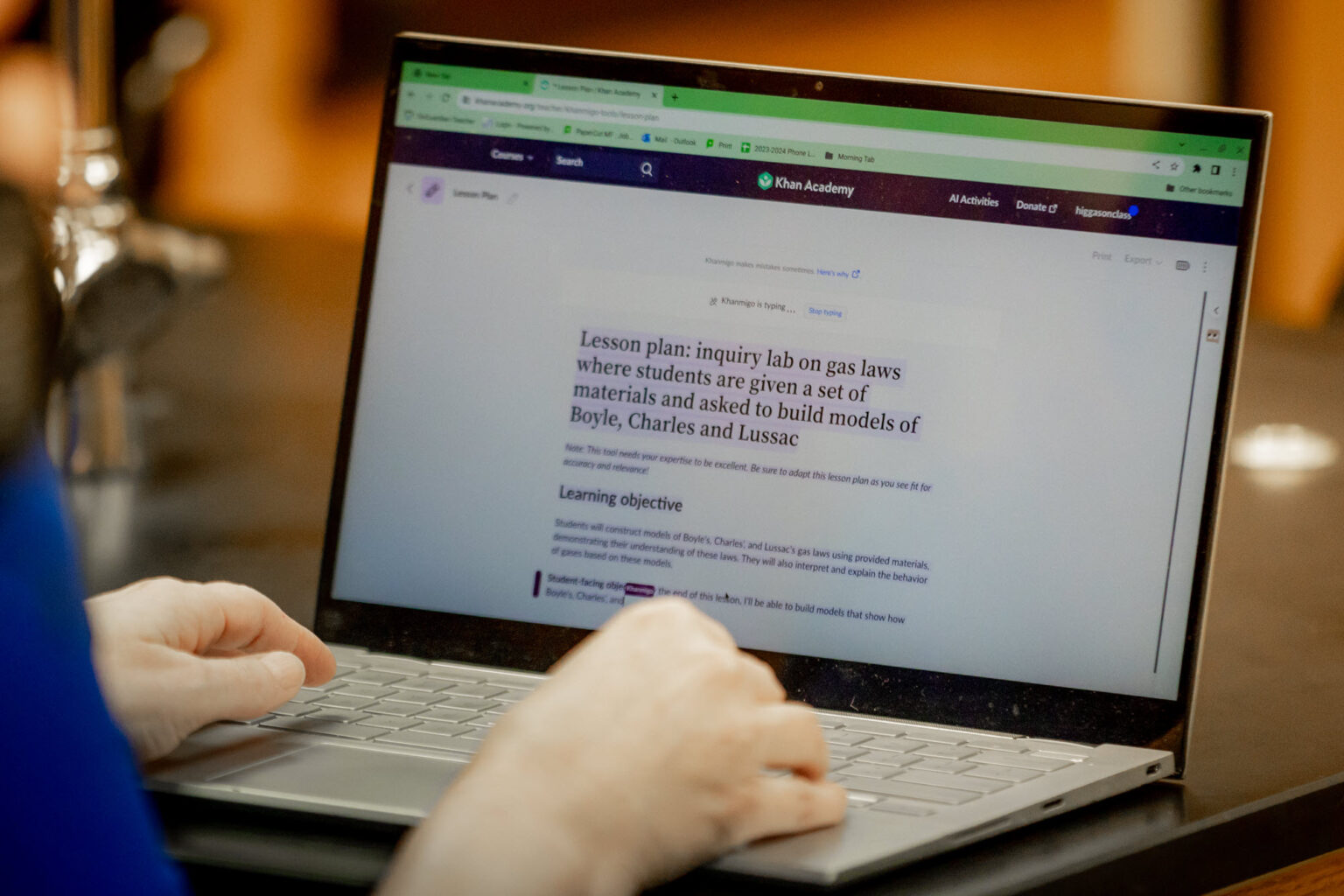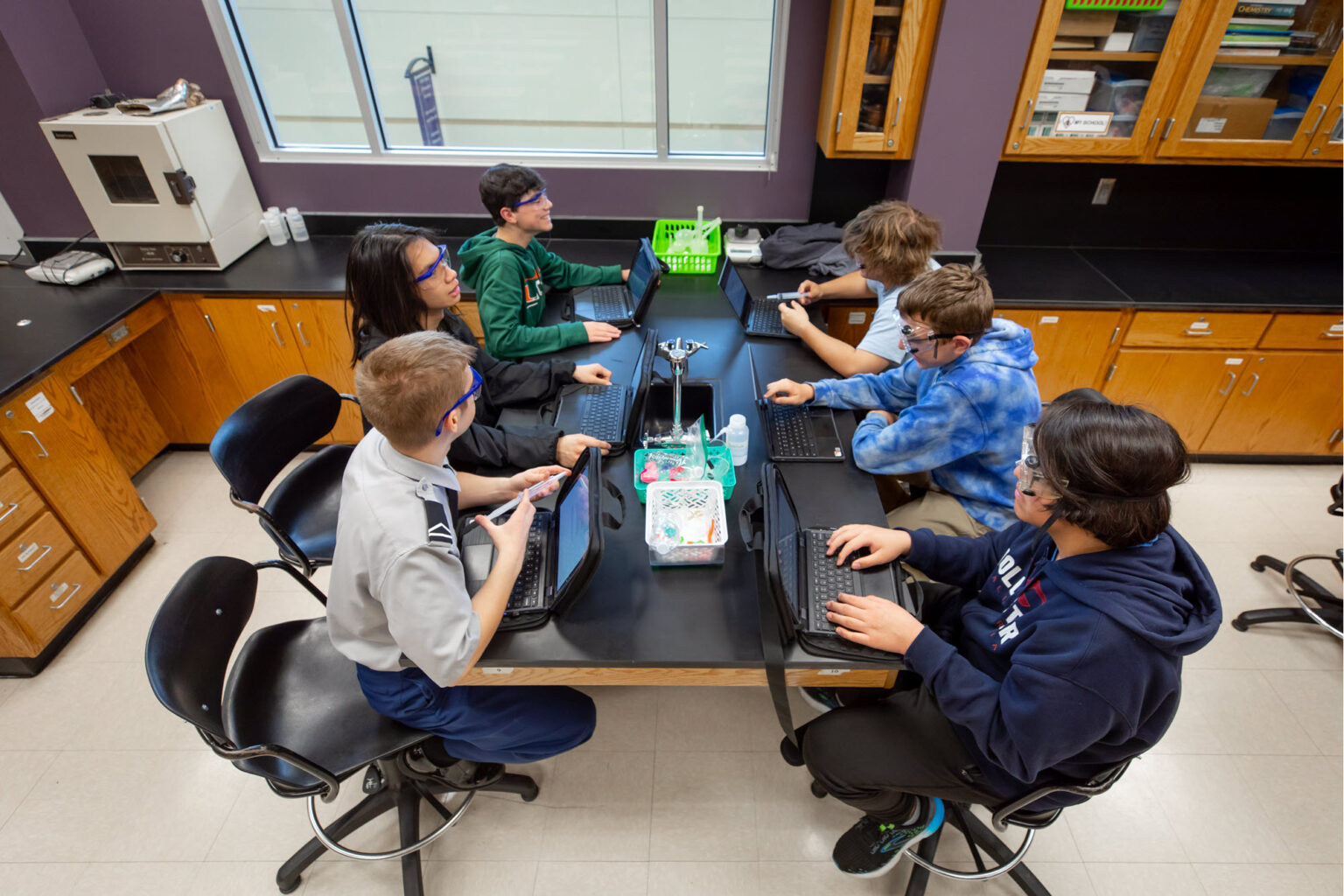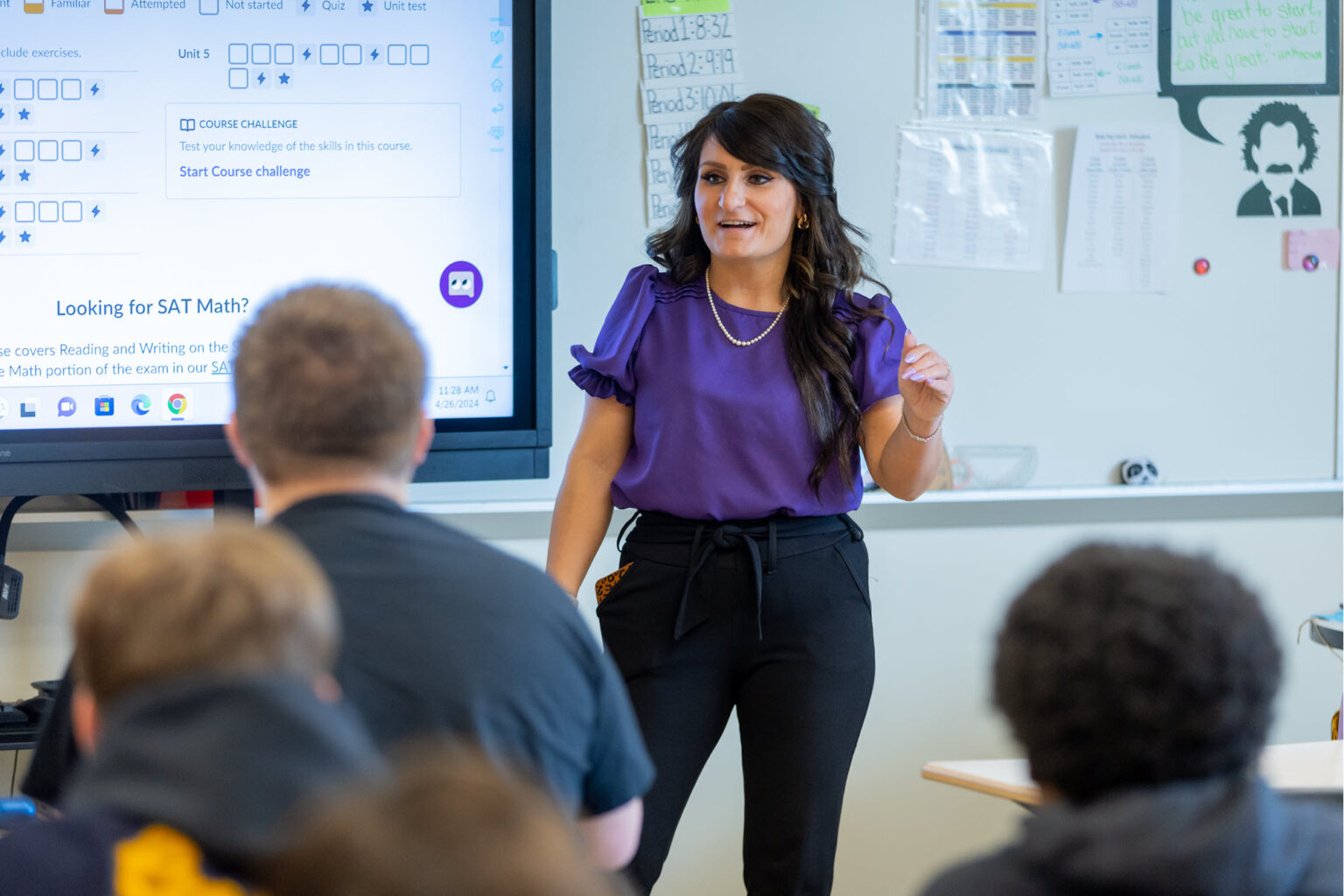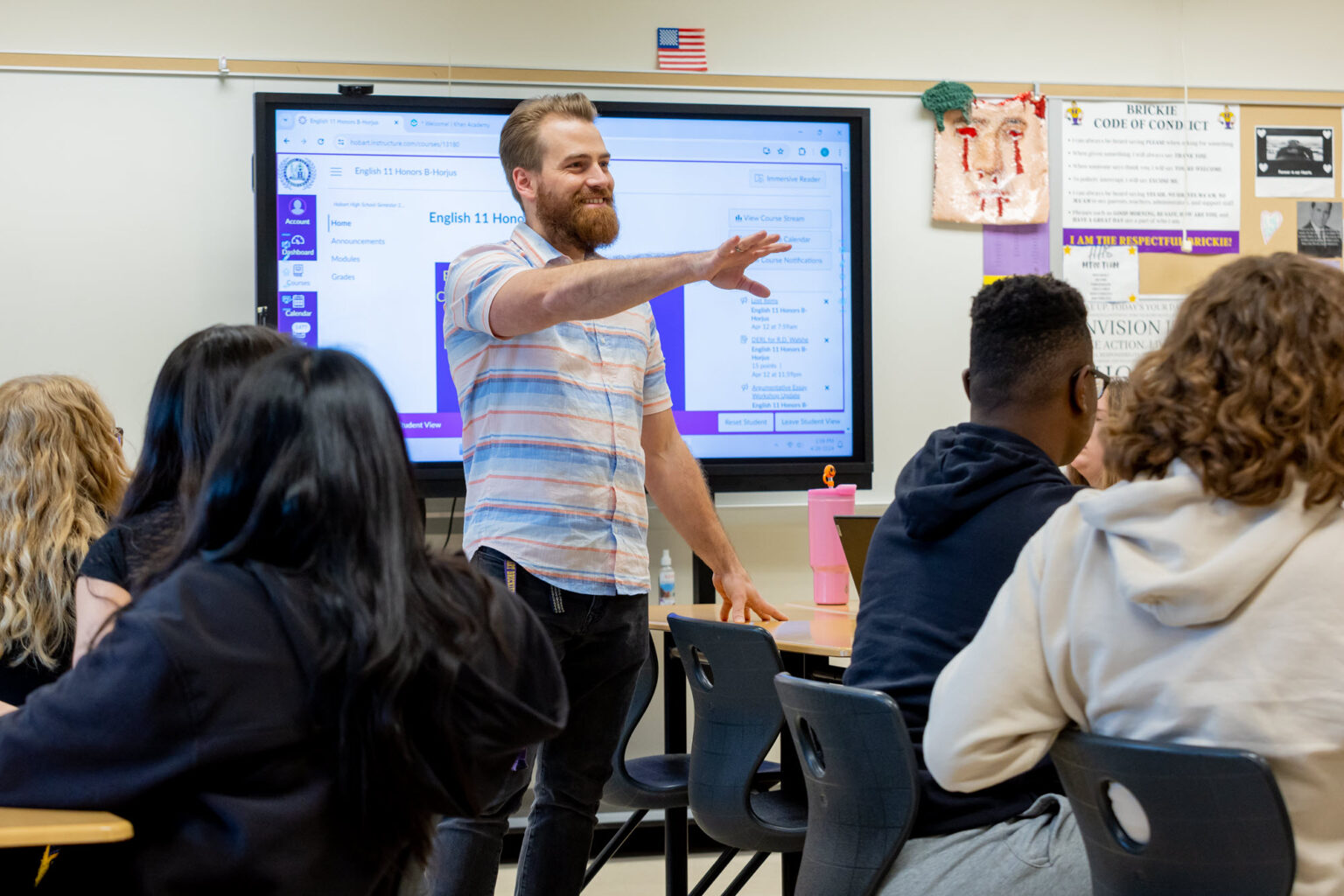Original article published by Microsoft (mở tab mới)
Tucked away in a high school chemistry classroom in Northern Indiana are pressure gauges intended to teach a fundamental principle of chemistry known as Boyle’s Law. In their place, Hobart High School chemistry teacher Melissa Higgason is using a variety of seemingly random items – including mini marshmallows, plastic water bottles, balloons and eyedroppers – to inspire her students to design their own experiments and see what happens to gas under different conditions.
“There are simulations where students are changing a variable and watching a number climb up and go down,” said Higgason. “But gas laws are very abstract. It’s hard for kids to make all those connections without hands on experiences that are relevant to them.”
While Higgason has decades of experience in education, she’s the first to admit the idea of using everyday items to teach physics came from an AI-powered teaching assistant called Khanmigo for Teachers (mở tab mới), a pilot program introduced last year by Khan Academy, the non-profit online educational organization started in 2008 by Sal Khan with a mission to provide a free, world-class education to anyone, anywhere.
Today at Microsoft Build, Microsoft and Khan Academy announced a new partnership that aims to bring these time-saving and lesson-enhancing AI tools to millions of educators. By donating access to Azure AI-optimized infrastructure, Microsoft is enabling Khan Academy to offer all K-12 educators in the U.S. free access to the pilot of Khanmigo for Teachers, which will now be powered by Azure OpenAI Service.
The two companies will also collaborate to explore opportunities to improve AI tools for math tutoring in an affordable, scalable and adaptable way with a new version of Phi-3, a family of small language models (SLMs) developed by Microsoft.
With AI tools, teachers have more time to spend on students
“I use Khanmigo to spice up my classroom to make it fun and engaging,” said Higgason. For example, in another class of Higgason’s, Khanmigo suggested explaining net ionic equations by asking students if they’ve ever been to a dance party, comparing ions to dancers who change partners.
Besides offering creative lesson plans, Khanmigo provides an array of AI-powered suggestions and teacher tools that relieve teachers of many of the administrative burdens that contribute to teacher burnout. With a click of an onscreen dashboard, in just a few minutes and often less, teachers can generate custom lesson plans, suggest student groupings, or “level” up or down text passages for learners who are either struggling or need more of a challenge. Used together, Khan Academy estimates these tools can save teachers an average of five working hours each week.

“Teachers are super overworked,” said Sal Khan, noting record numbers of teachers are leaving the profession. School districts in underserved areas have been especially hard hit, with teachers citing low pay and unmanageable workloads exacerbated by the COVID-19 pandemic as some of the top reasons they are giving up on teaching. Using AI for education isn’t just a powerful way to potentially help accelerate student learning, said Khan, it’s also a way “to make teaching more sustainable.”
Bringing high-quality educational experiences to more learners
While earning rave reviews from teachers like Higgason since it launched in March 2023, Khanmigo previously cost teachers $4 per month. The fees covered the cost of developing and testing the new technology and accessing the large language models (LLMs) that power Khanmigo.
As part of the new partnership, Khan Academy’s teacher tools will now be powered by Azure OpenAI Service. Microsoft’s donation of Azure infrastructure will enable the nonprofit educational organization to scale those teacher tools more widely and offer them to all K-12 teachers in the U.S. at no cost.
The companies will also explore how small language models (SLMs) such as Microsoft’s new Phi-3 family of models, which can perform well for simpler AI tasks and are more cost effective and easier to use than larger models, might help improve and scale AI tutoring tools. To that end, Khan Academy is collaborating with Microsoft to explore the development of new, open-source small language models based on Phi-3. The goal of the exploratory work is to enable state-of-the-art math tutoring capabilities in an affordable and scalable manner.
Small language models offer many of the same capabilities found in large language models but are smaller and trained on smaller amounts of data. They are also designed to be more accessible and easier to use for organizations with limited resources.
Under their new agreement, Khan Academy will also give Microsoft access to explanatory educational content such as math problem questions and step-by-step answers to develop AI-powered math tutoring capabilities using Phi-3. Khan Academy will also provide ongoing feedback and benchmarking data to evaluate performance. None of Khan Academy’s user data will be used to train the model.
Khan is excited about the opportunity to collaborate with Microsoft to train small language models in math tutoring – an area where he sees great potential.
Not only are small language models easier to customize than large language models for specific tasks, such as teaching math, English or chemistry – they are also more efficient. “If they can get comparable to the larger frontier models but at a dramatically lower cost, that dramatically increases the speed at which we can make this accessible to more people,” said Khan.
In the future, Khan hopes small language models that operate locally on a device (as opposed to the cloud) will create opportunities to provide teacher tools and tutors for resource-constrained schools outside the U.S. that lack computing infrastructure.
Finally, the two organizations will also work to integrate more Khan Academy content into Copilot and Teams for Education, a free version of Microsoft’s popular Teams app to enhance collaboration and learning customized to meet the needs of educators and students. The integration will make Khan Academy’s vast educational library available to even more learners, while providing high-quality content to users of Copilot and Teams for Education.
Tutoring with AI and the Socratic method
Back in Hobart, Indiana, students in Higgason’s class, who have access to a separate set of AI-powered Khanmigo learning tools through its Khan Academy Districts partner program, have embraced its conversational Socratic method of tutoring, characterized by cheerful, energetic questioning to encourage critical thinking by students
They’ve also welcomed the AI teaching assistant’s creative suggestions to enliven normally staid chemistry lessons that have saved Higgason so much time.
“Using a marshmallow and an eye dropper in a lab – I didn’t think you could use that to show a gas law,” said Madisyn Sanders, a 16-year-old sophomore. “It was a really interesting experiment.”
“Khanmigo learns the same way I do,” added Aleksandar Tatum, 16. “It’s almost taking the steps with you. It helps you build a connection to help you better understand subjects.”
Using AI to cheat is a major concern of many parents and teachers, but cheating is difficult with Khanmigo, as it does not do the writing for students. Instead of providing answers, Khanmigo asks questions and provides support as a tutor would do.

In English class, Tatum and his classmates were asked to read “Romeo and Juliet”and then write a story that changed some of the scenes. Tatum prompted Khanmigo to describe a scene he had trouble remembering. “It was a genuine question I had about Act 1 Scene 3,” he said. But Khanmigo would only respond, “I’m here to help you create a story,” and Tatum had to go back to the original text to refresh his memory.
When Jzehbel Garcia, 17, asked Khanmigo to provide the formula for “molality,” another abstract chemistry concept, Khanmigo responded with a hint and then a question: “What two pieces of information do you think you need to calculate molality?”
“What’s really nice from a teacher’s perspective is it does not give my students answers. It gives them questions,” said Higgason. “Science is about asking really good questions. That’s how we learn and grow and innovate.”
Khan Academy also provides guardrails and safety mechanisms in Khanmigo. Messages at the top of the screen notify students that their chat history and activities are visible to parents and teachers. The system also automatically flags questions or comments from students that are considered problematic, so teachers can review and decide if follow-up with the student is needed.
Using Khanmigo teacher tools to meet unique student needs
Before Khanmigo was introduced to Hobart in 2023, “I was drowning,” said Stephanie Franco, a teaching specialist who supports over 40 students still learning English by collaborating with more than 70 teachers located in two different buildings on the school campus.
She was skeptical about bringing AI into the classroom, concerned like many parents and educators that it would lead to cheating.

But once she discovered Khanmigo’s translation tools, “it was a breakthrough,” said Franco. Before Khanmigo was available at Hobart, she would spend hours scouring her students’ assignments to change wording or vocabulary that could prove challenging.
Now she simply copies and pastes those assignments into the Khanmigo teacher chat function and types “make this understandable to a 7th grader.” In seconds, she said, she has a new assignment tailored to the needs of her students: “So instead of my students not being able to be included in the same assignments as their classmates since they’re still learning English, I can now provide them with a similar assignment that is more tailored to their learning needs.”
Besides offering support for multi-language learners, Franco also teaches English as a second language. Again, she taps Khanmigo to create lesson plans and prompts to engage her students in discussion. “I’ll say, ‘Help me find a story that would help my students with reading comprehension.’ Or I can tell Khanmigo about a famous story and it will make up questions to ask the kiddos,” she said.

Asking questions is not something that comes naturally to most high schoolers. Writing, too, is a challenge for many students, who often don’t know where to begin. Ben Horjus, who teaches essay writing and composition at Hobart, said many high school students “struggle to pick a focus area, to recognize credible sources, and to synthesize information so they can develop a stance supported by research. In this vast sea of information, it’s hard for them to know how to navigate and not feel lost.”
With these challenges in mind, Horjus uses several Khanmigo teacher tools, including the “learning objectives” feature, which gives him ideas for student assignments along with activities and discussion topics. He also likes using it to develop guides for instruction for individual students or groups of students. And he’s looking forward to using the “leveler” function, which can be used to simplify complex text, to demystify the more challenging parts of “The Crucible,” which he plans to teach next fall.
Coming full circle
In many ways, Khan said, the advent of AI-powered teaching and learning is a throwback to the origins of education, when 1:1 tutoring was the norm. Alexander the Great, the Macedonian conqueror, was tutored by Aristotle, the Greek philosopher, who in turn was tutored by Plato, who was tutored by Socrates, who pioneered the Socratic method of asking questions to guide students to knowledge.
“You could imagine that if young Alexander was having difficulty with some topic, that Aristotle would slow down or speed up, or make sure that this young man who’s going to be a future king or emperor is engaged in his learning,” said Khan.
By partnering with Microsoft, Khan hopes to provide more support for teachers so they can bring personalized teaching and learning to more classrooms, enabling many more students to one day help solve the world’s toughest challenges. “We can use the same tools,” said Khan, “to treat every kid like a future emperor.”

Bài viết liên quan
Returning Home to Give Back – Part 2: Light from the Heart
While living and working abroad, Mr. Kien has remained deeply concerned by the reality that...
Jan
The Vietnam Foundation launches the Vietnamese version of Khanmigo – an AI-powered teaching assistant free for teachers nationwide
In recent years, the integration of artificial intelligence (AI) into learning has reshaped the global...
Dec
The bridge builder of education between Vietnam and the world
From his own journey, Mr. Kien Pham (Vietnamese American) deeply understands the transformative power of...
Oct
Vietnam Foundation and Department of Science, Technology, Information share a common vision on the teacher’s role in the AI-driven education
Artificial intelligence (AI) is rapidly advancing and exerting a profound influence across all sectors, and...
Sep
Vietnam ready to implement AI in education – time to choose the right tools
Vietnam is showing strong determination in applying artificial intelligence (AI) to education. With large-scale training...
Sep
Khanmigo and its pioneering role in the AI education era
Khanmigo – an AI assistant dedicated to education – helps students hone critical thinking through...
Sep